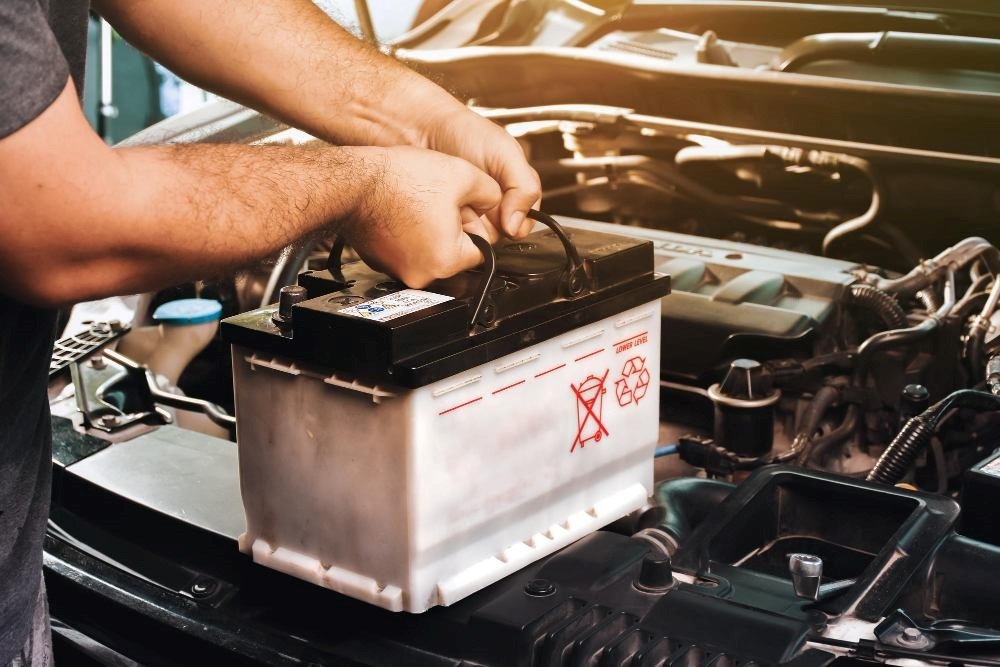Your car battery is one of the most crucial components of your vehicle, providing the power needed to start the engine and run electrical systems. However, car batteries don’t last forever. Without proper maintenance and regular servicing, they can wear out prematurely, leaving you stranded at the worst possible time. In this blog, we will explore practical tips on how to extend the life of your car battery through regular servicing and maintenance practices.

Understanding Your Car Battery
Before diving into maintenance tips, it’s important to understand the basics of how your car battery works and why it needs regular care. Your car battery stores electrical energy and releases it to start the engine and power accessories like lights, radio, and air conditioning. Over time, batteries can lose their charge capacity due to various factors, including temperature extremes, frequent short trips, and lack of maintenance.
Regular Battery Servicing: The Key to Longevity
- Routine Inspections
Regular inspections are the cornerstone of effective battery maintenance. During these inspections, a technician will check the battery for signs of wear and tear, such as corrosion, leaks, and physical damage. Catching these issues early can prevent more significant problems down the road.
What to Look For
- Corrosion: Battery terminals and cables can develop corrosion, which looks like a white, ashy substance. This can hinder the battery’s ability to charge and discharge properly.
- Leaks: Any signs of fluid leakage around the battery indicate a serious problem and require immediate attention.
- Damage: Cracks or swelling in the battery case are signs that the battery is failing and should be replaced.
- Cleaning the Terminals
Corroded battery terminals can prevent your battery from charging fully. Regular cleaning of the terminals ensures a good connection between the battery and the electrical system.
How to Clean Battery Terminals
- Safety First: Wear gloves and eye protection.
- Disconnect the Battery: Remove the negative terminal first, followed by the positive terminal.
- Clean the Terminals: Use a mixture of baking soda and water to clean the terminals with a wire brush.
- Reconnect the Battery: Reattach the positive terminal first, followed by the negative terminal.
- Checking the Voltage
Regularly checking the voltage of your car battery can help you monitor its health. A fully charged car battery should read around 12.6 volts or more. If the voltage is below 12.4 volts, it’s a sign that the battery is not holding a charge properly and may need servicing.
How to Check Battery Voltage
- Multimeter: Use a digital multimeter to measure the voltage.
- Engine Off: Ensure the engine is off and the battery has rested for a few hours.
- Read the Voltage: Place the multimeter probes on the battery terminals and read the voltage.
- Ensuring Proper Charging
Regular servicing includes checking the car’s charging system to ensure the battery is charging properly while the engine is running. An undercharging or overcharging battery can significantly shorten its lifespan.
Alternator Check
During a service, the technician will check the alternator to ensure it’s providing the correct amount of charge to the battery. A faulty alternator can either overcharge the battery, causing it to overheat or undercharge it, leaving it weak and underpowered.
- Avoiding Short Trips
Frequent short trips can prevent your car battery from fully charging. If you often drive short distances, your battery may never reach a full charge, leading to sulfation – a condition where lead sulfate crystals form on the battery plates and reduce its efficiency.
Tips for Longer Battery Life
- Combine Trips: Try to combine errands into one longer trip to give your battery time to charge fully.
- Occasional Long Drives: Take your car on a longer drive occasionally to allow the battery to reach a full charge.
- Temperature Control
Extreme temperatures can have a significant impact on your car battery’s life. Both hot and cold temperatures can affect the battery’s performance and longevity.
Hot Weather
- Heat Shield: Use a battery heat shield or thermal blanket to protect the battery from extreme heat.
- Park in the Shade: Whenever possible, park your car in a shaded area to reduce exposure to high temperatures.
Cold Weather
- Battery Warmer: In extremely cold climates, consider using a battery warmer to keep the battery at an optimal temperature.
- Frequent Use: During cold weather, frequent use of your vehicle can help keep the battery warm and prevent it from freezing.
- Professional Battery Servicing
While some battery maintenance tasks can be done at home, professional servicing is essential for ensuring your battery’s longevity. Regular visits to a trusted service center can help identify and address issues that may not be apparent during routine inspections.
Comprehensive Battery Service
A professional battery service includes:
- Load Testing: Assessing the battery’s ability to hold a charge under load.
- Electrolyte Level Check: For non-sealed batteries, ensuring the electrolyte levels are adequate.
- System Check: Ensuring the entire electrical system is functioning correctly, including the starter and alternator.
Trust Enhanced Motors for Your Battery Servicing Needs
Regular battery servicing is key to extending the life of your car battery and ensuring your vehicle remains reliable. By following these maintenance tips and seeking professional help when needed, you can avoid the inconvenience and cost of unexpected battery failures.
For top-notch battery servicing and comprehensive automotive care, visit Enhanced Motors. Their skilled technicians use the best diagnostic tools to ensure your battery remains in peak condition. With Enhanced Motors, you can drive with confidence, knowing your car’s battery is in expert hands.




